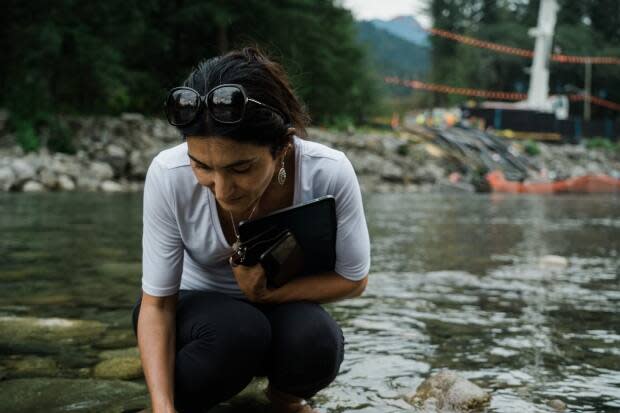Concerns over salmon prompt calls to pause Trans Mountain construction on Coquihalla River

Construction of the Trans Mountain pipeline expansion has started in the Coquihalla River in Hope, B.C., at the same time as the salmon migration — prompting calls to stop the work over concerns about the safety of the salmon population.
Kate Tairyan said she was walking along the river on July 31 and saw dozens of salmon swimming upstream.
The salmon had arrived in the river earlier than normal.
"I was so excited but also very surprised," said Tairyan, a professor of health sciences at Simon Fraser University and a member of Protect the Planet, a group opposed to the Trans Mountain expansion.
But her excitement turned to concern after she found more than a dozen dead salmon in the days that followed.

The fish were seemingly healthy, many with bellies full of eggs. Tairyan says it's unusual to see so many dead salmon so early in the spawning season.
She worries it's because of the Trans Mountain pipeline expansion work taking place in the river. Trans Mountain is digging up the river bed to install an expanded pipeline while at the same time replacing a segment of the current pipeline.
"This is a barrier, a physical barrier for the salmon to pass and you can see them struggling to to do that," she said.
Tairyan says drone footage shows salmon in the work site. She worries they are trapped between excavators, construction equipment and water pumps.
Protect the Planet is calling on Fisheries and Oceans Canada (DFO) to force Trans Mountain to pause its work.

Conservationist Tim Takaro says Trans Mountain has a permit for trenching across the river during a "least-risk window."
"What we're saying is this year, the least-risk window is not its usual time," he said.
With salmon stocks already on the decline in B.C., Takaro says the stakes are too high to risk losing any more.
"They represent a key part of our ecosystem," he said. "They nourish the forests.They nourish the people."
Federal government urged to investigate complaints
While it's unclear what caused the salmon to die, Trans Mountain says in a statement that "great care is taken to preserve the environmental features around the river, such as the wildlife and aquatic habitat."
B.C. Environment Minister George Heyman said on Twitter Tuesday night that he is aware of reports about Trans Mountain's work on the Coquihalla River and the province is investigating areas within its jurisdiction.
He said the B.C. Conservation Officer Service attended the site Monday and shared information with relevant oversight bodies, including the DFO and the B.C. Oil and Gas Commission, which has sent an inspector to the site.
"We have urged the federal government, including DFO and the Canada Energy Regulator, to fully investigate these complaints and take appropriate action to protect wild salmon and B.C. waterways if any wrongdoing is found," Heyman said.
Tairyan hopes DFO investigates the situation soon.
"This river is a lifeline," she said.

 Yahoo Movies
Yahoo Movies 